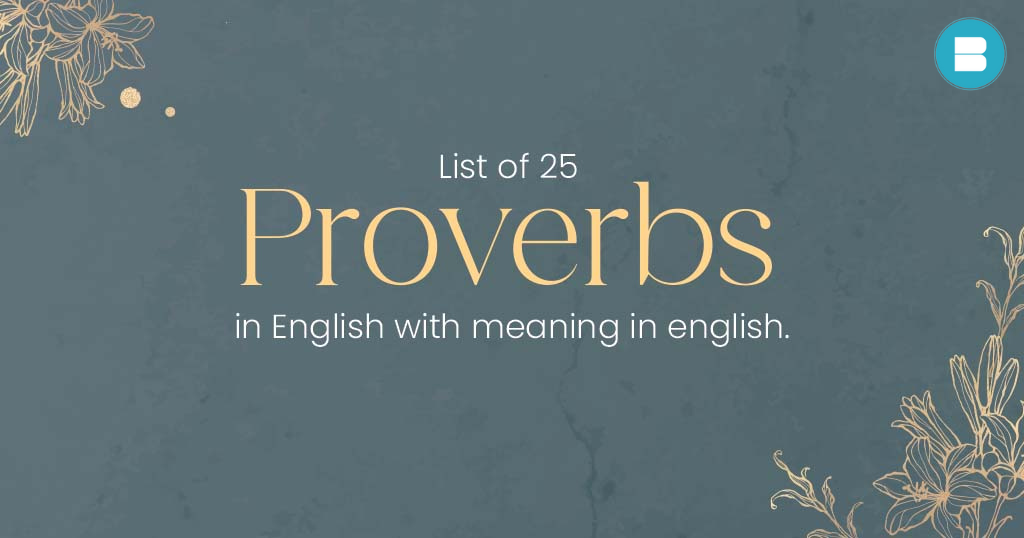Proverbs in English is more than just a collection of words strung together; it’s a time-honored, culturally-rich way of sharing wisdom, offering guidance, and teaching moral lessons. These short, well-known sayings are passed down from generation to generation, each one a precious nugget of knowledge gleaned from the collective experience of our ancestors.
Often using metaphorical language, proverbs cut to the heart of what it means to be human, offering insights into the joys and sorrows of life, and providing practical advice on how to navigate its complexities. From the familiar to the obscure, from the ancient to the modern, proverbs can be found in nearly every culture and language, reminding us that despite our differences, we share a common bond as members of the human family.
Read: Why are Literary Devices Used in Literature? Types of Literary Devices that You Must Know About.
In many ways, proverbs with their meaning are like small treasures, their value increasing with each passing year. Each time we hear one, it’s like we’re unearthing a precious gem, polishing it with our own understanding, and passing it on to future generations. And like gems, idioms and proverbs come in all shapes and sizes, from the simple to the complex, the humorous to the serious.
Whether we use them in everyday conversation, or encounter them in literature or public speaking, proverbs have the power to inspire, encourage, and enlighten. They remind us that we’re not alone in our struggles, that others have faced the same challenges and triumphed. They offer us a roadmap for navigating life’s ups and downs, and show us that even in the darkest of times, there is hope.
Here is a list of 25 Proverbs in English Literature with Meaning & Examples:
- “Actions speak louder than words.” – People’s actions are more important than their words. One example from literature that demonstrates the proverbs with their meaning “actions speak louder than words” is in the classic novel “To Kill a Mockingbird” by Harper Lee.
- “All is fair in love and war.” – In situations where emotions, plot and conflict are involved, people are allowed to use any means necessary to achieve their goals. One example of this concept in literature can be seen in the classic novel “Wuthering Heights” by Emily Bronte.
- “A penny saved is a penny earned.” – Saving money is just as valuable as earning money. One example from english literature that demonstrates this concept is found in the novel “David Copperfield” by Charles Dickens.
- “A stitch in time saves nine.” – Taking care of a problem early will prevent it from getting worse and requiring more effort to fix later. One example from literature that illustrates this concept is found in the classic novel “Jane Eyre” by Charlotte Bronte.
- “Don’t judge a book by its cover.” – Don’t make assumptions about someone or something based on appearance alone. One example from literature that illustrates this concept is found in the novel “To Kill a Mockingbird” by Harper Lee.
- “The early bird catches the worm.” – The person who starts their day early and is proactive will have more success. One example from literature that illustrates this concept is found in the novel “Pride and Prejudice” by Jane Austen.
- “Better late than never.” – It’s better to do something even if it’s late, than to not do it at all. One example from literature that illustrates this concept is found in the classic novel “The Great Gatsby” by F. Scott Fitzgerald.
- “You can’t have your cake and eat it too.” – You cannot have two incompatible things at the same time. One example from literature that illustrates this concept is found in the novel “The Picture of Dorian Gray” by Oscar Wilde.
- “A bird in the hand is worth two in the bush.” – It’s better to have something of value that is certain, rather than something that is uncertain and may not be obtained. One example from literature that illustrates this concept is found in the play “Macbeth” by William Shakespeare.
- “Honesty is the best policy.” – It’s better to be truthful and honest in all situations. In Mark Twain’s classic novel “The Adventures of Tom Sawyer,” the protagonist Tom convinces his friends to trade him their prized possessions in exchange for the privilege of whitewashing a fence.
- “An apple a day keeps the doctor away.” – Eating healthy and taking care of oneself can prevent illness. In Roald Dahl’s beloved children’s book “James and the Giant Peach,” the titular character discovers a magical peach that allows him to travel to a faraway land.
- “Where there’s smoke, there’s fire.” – If there are rumors or indications of something, there’s probably some truth to it. In Arthur Conan Doyle’s famous detective novel “The Hound of the Baskervilles,” rumors of a supernatural beast that haunts the moors of Dartmoor in Devonshire lead Sherlock Holmes and Dr. Watson on a dangerous investigation.
You may also read: 10 Magical Books That Combine Christmas and Fantasy
You may also read: Adjectives that starts with e | Words Popular in America
Famous Proverbs
Famous proverbs in English are short, pithy sayings that convey a universal truth or a practical piece of wisdom. These proverbs have become widely known and quoted due to their relevance to human experience and their enduring popularity. Some examples of famous proverbs include:
- “Actions have consequences.” – Every action has a reaction or consequence, whether positive or negative. In Fyodor Dostoevsky’s novel “Crime and Punishment,” the main character, Raskolnikov, commits a murder and must face the consequences of his actions.
- “The grass is always greener on the other side.” – People often believe that others have it better than they do, when in reality, they may not. In Jane Austen’s classic novel “Pride and Prejudice,” the protagonist Elizabeth Bennet initially believes that Mr. Darcy is proud and unapproachable, while admiring the charming and affable Mr. Wickham.
- “Beggars can’t be choosers.” – If someone is in a position of need, they must accept whatever help they can get. In Victor Hugo’s novel “Les Misérables,” the protagonist Jean Valjean is a former convict who is struggling to survive on the streets.
- “You can’t have your cake and eat it too.” – You cannot have two incompatible things at the same time. One example from literature that illustrates this concept is found in the novel “The Picture of Dorian Gray” by Oscar Wilde.
- “Curiosity killed the cat.” – Being too curious can lead to danger or negative consequences. In Lewis Carroll’s classic children’s book “Alice’s Adventures in Wonderland,” Alice’s curiosity leads her on a series of bizarre and dangerous adventures.
- “A rolling stone gathers no moss.” – Someone who is constantly moving and changing will not accumulate much in life. In J.D. Salinger’s novel “The Catcher in the Rye,” the main character Holden Caulfield is constantly moving from place to place and struggling to find a sense of purpose or direction in his life.
- “You reap what you sow.” – Your actions have consequences and will come back to you in some way. In the book “The Count of Monte Cristo” by Alexandre Dumas, the protagonist Edmond Dantès is wrongly imprisoned for years before escaping and seeking revenge on those who wronged him.
- “Out of sight, out of mind.” – People tend to forget about things or people that are not visible to them. In the book “The Scarlet Letter” by Nathaniel Hawthorne, the character Hester Prynne wears a scarlet letter “A” on her chest as a symbol of her adultery.
- “A watched pot never boils.” – When you’re impatiently waiting for something, it seems to take longer. In the book “Harry Potter and the Goblet of Fire” by J.K. Rowling, the character Harry eagerly waits for a letter from his godfather Sirius Black, but it never arrives because it is intercepted by someone else.
- “Two heads are better than one.” – Collaborating with others can result in better ideas and solutions. In the book “The Lord of the Rings” by J.R.R. Tolkien, the protagonist Frodo Baggins goes on a perilous journey to destroy the One Ring with the help of his friends and allies.
- “All that glitters is not gold.” – Not everything that appears attractive is actually valuable or good. In “The Merchant of Venice” by William Shakespeare, the character Portia warns against choosing a suitor based solely on outward appearance.
- “When in Rome, do as the Romans do.” – When in a foreign place, it’s best to follow the customs and traditions of the locals. In “Around the World in Eighty Days” by Jules Verne, the protagonist Phileas Fogg follows this proverb while in India, adapting to local customs and dress to avoid drawing attention to himself.
- “Time heals all wounds.” – Given enough time, even the most painful experiences can eventually be overcome or forgotten. “The Kite Runner” by Khaled Hosseini is a novel that explores the idea that “Time heals all wounds.” The protagonist, Amir, experiences guilt and shame over past events, but over time, he is able to come to terms with his past and find redemption.
You may also read: What is Dramatic Irony in Literature? Definition, Examples and Tips
You may also read: 10 Best Fiction Books Set in America You Must Read
Finally, idioms and proverbs are a strong tool for conveying knowledge and instruction in a brief and memorable manner. These short sayings, which are frequently passed down through generations, provide insights into the human experience and a framework for making decisions and overcoming life’s obstacles.
Proverbs have the capacity to inspire and teach, delivering useful lessons that can be implemented in a variety of circumstances whether employed in regular conversation, literature, or public speaking. We can get a deeper awareness of the world around us and make more informed judgments in our daily lives by learning and embracing the teachings presented in these proverbs.
















